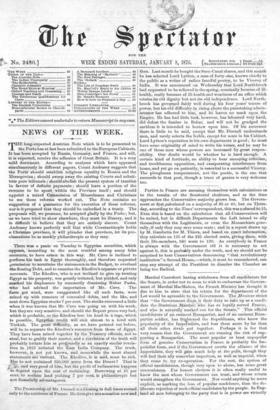• There was a panic on Tuesday in Egyptian securities,
which appears, according to the most truthful among many false accounts, to have arisen in this way. Mr. Cave is inclined to perform his task in Egypt thoroughly, and therefore requested i)ernaission to scrutinise the statements in the Budget, to overhaul he floating Debt, and to examine the Khedive's separate or private accounts. The Khedive, who is not inclined to give up treating Egypt as his property, was greatly irritated, but yielded, and only marked his displeasure by summarily dismissing Nubar Pasha, who had advised the importation of Mr. Cave. The facts got wind, were exaggerated like all such facts, were mixed up with rumours of concealed debts, and the like, and sent down Egyptian stocks 7 per cent. The stocks recovered a little when it was known that Mr. Cave was going on with his work, but they are very sensitive, and should the Report prove very bad, which is probable, or the Khedive lose his head in a rage, which is possible, Egyptian credit will sink almost to a level with Turkish. The great difficulty, as we have pointed out before, will be to separate the Khedive's resources from those of Egypt. 'They have been mixed together by the Treasury officials, not to steal, but to gratify their master, and a revelation of the truth will probably irritate him as profomidly as an exactly similar revela- tion in 1813 irritated the East India Company. The truth, however, is not yet known, and meanwhile the most absurd statements are current. The Khedive, it is said, must be rich. Has he not reclaimed 350,000 acres from the Desert? That is r so, and very good of him, but the profit of reelamation happens --
to depend upon the cost of reclaiming. Borrowing at 10 per cent, to reclaim land yielding 7 per cent, is philanthropic but not financially advantageous.


































